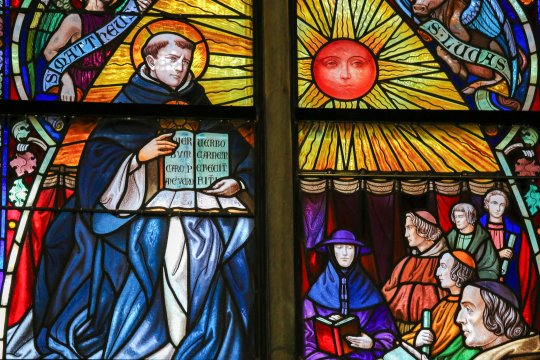Can We Be Good On Our Own? Ancient Pagans and Modern Scientists on Thomistic Moral Virtue

Angela KnobelUniversity of Dallas
Daniel LapsleyUniversity of Notre Dame
Emily AustinUniversity of Chicago
Candace VoglerUniversity of Chicago
REGISTER HERE to attend the in-person symposium
REGISTER HERE to attend on Zoom
Open to students and faculty. For more information, contact dstrobach@lumenchristi.org.
This event is cosponsored by the University of Notre Dame Press and made possible through the support of ‘In Lumine: Supporting the Catholic Intellectual Tradition on Campuses Nationwide’ (Grant #62372) from the John Templeton Foundation.
Thomas Aquinas, like a good Aristotelian, holds that the moral virtues can be cultivated in human beings by habitual moral action. And like a good Christian, he also holds that God can gift (or 'infuse') the moral virtues into a human being. Can humans become good on their own? Or do they require external assistance? This symposium will consider the question of infused moral virtue: how does Aquinas describe the bestowal of moral virtues on an individual by God? How is his description related to the classical account of virtues acquired by virtuous action? How does modern science make sense of these insights? Essentially, the question is the following: What would pagan philosophers and modern psychologists (or ‘scientists-of-mind’) make of what Thomas Aquinas says about the work of grace in the moral life?
In this symposium, Angela Knobel (Associate Professor of Philosophy, University of Dallas) will present a Thomistic perspective of the interplay between grace and virtuous action in the moral life. Then, Candace Vogler will respond on the inadequacies of Aristotle. Daniel Lapsley (Professor of Psychology, University of Notre Dame) will offer an opinion on what modern psychology might say to Aristotle and Aquinas. Emily Austin (Assistant Professor of Classics, University of Chicago) will moderate as the conversation develops.
On Saturday, Prof. Knobel will lead a Master Class titled Aquinas on Virtue and Grace in the Moral Life.
Angela Knobel is an associate professor at the University of Dallas. She received her doctorate in philosophy from the University of Notre Dame in 2004. Her work focuses primarily on Aquinas’ theory of infused virtue, virtue ethics and applied ethics. She is the author of Aquinas and the Infused Moral Virtues (Notre Dame, IN: University of Notre Dame Press 2021). She has published articles on a wide variety of topics, including feminism, abortion, moral change, and the acquisition and loss of virtue. Her work has appeared in The Cambridge Companion to Aquinas, in journals such as Studies in Christian Ethics, The Thomist, The Journal of Moral Theology and in a variety of other journals and edited volumes.
Daniel Lapsley is the ACE Collegiate Professor and former chair of the Department of Psychology at the University of Notre Dame.
Lapsley’s research focuses on various topics in adolescent social cognitive and personality development, including work on adolescent invulnerability and risk behavior, narcissism, separation-individuation, self, ego and identity development, and college adjustment. He also studies the moral dimensions of personality and other topics in moral psychology, and has written on moral identity and moral and character education.
Professor Lapsley is the author or editor of seven books, including Personality, Identity and Character: Explorations in Moral Psychology (co-edited with D. Narvaez; 2009); Character psychology and character education (co-edited with F. C. Power; 2005); Moral development, self and identity (co-edited with D. Narvaez; 2004); and Moral psychology (1996; translated into Korean and Mandarin Chinese). He has published over 120 articles and chapters on various topics on adolescent development and educational psychology, and he currently serves on the editorial boards of the periodicals Applied Developmental Science, Human Development, Educational Psychologist and the Journal of Early Adolescence.
Emily Austin is an assistant professor of Classics at the University of Chicago. She writes on Homer, especially emotions, as well as literary depictions of solitude in ancient Greece. Her first book, Grief and the Hero: the Futility of Longing in the Iliad, explores the nexus of grief, longing and anger in the Iliad. This work begins with a verbal find—Achilles’ grief for Patroklos is uniquely described with the Greek word “longing” (ποθή)—and through this discovery, the book traces the relationship between grief and action, giving a narrative account for why Achilles’ anger is insatiable. Her current research projects include a second book, Solitude and its Powers in Ancient Greece (in progress), which identifies surprising moments when ancient Greek poetry conceives of solitude as a good thing. In addition, Austin has written articles on Homeric similes and their relation to the narrative; meaningful variation in Homeric formulae; and the power of inactivity in the Homeric Hymn to Demeter and the Iliad.
Candace Vogler is the David B. and Clara E. Stern Professor of Philosophy and Professor in the College at the University of Chicago, and Principal Investigator on "Virtue, Happiness, and the Meaning of Life," a project funded by the John Templeton Foundation. She has authored two books, John Stuart Mill's Deliberative Landscape: An Essay in Moral Psychology (Routledge, 2001) and Reasonably Vicious (Harvard University Press, 2002), and essays in ethics, social and political philosophy, philosophy and literature, cinema, psychoanalysis, gender studies, sexuality studies, and other areas. Her research interests are in practical philosophy (particularly the strand of work in moral philosophy indebted to Elizabeth Anscombe), practical reason, Kant's ethics, Marx, and neo-Aristotelian naturalism.
She received a Ph.D. from University of Pittsburgh in 1994 and a Ph.D. certificate, Program for the Study of Culture, in 1992. She received a B.A. from Mills College in Philosophy with Honors in 1985.





